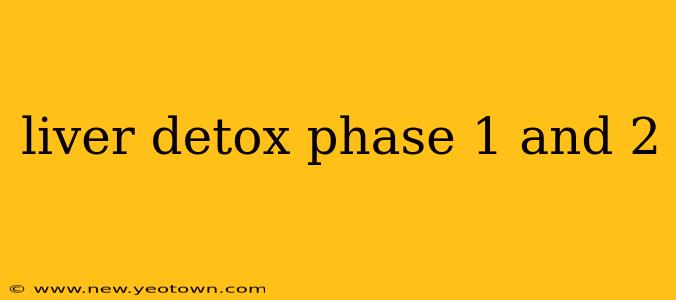Our liver, a tireless workhorse, silently performs thousands of vital functions, including detoxifying our bodies. It's a complex process, not a single event, and understanding its nuances can help us support this crucial organ. This journey into liver detoxification will explore the two-phase process, addressing common questions and dispelling myths.
Imagine your liver as a sophisticated chemical plant, meticulously processing everything that enters your bloodstream. This processing, or detoxification, unfolds in two distinct phases: Phase 1 and Phase 2. Each phase plays a crucial, interconnected role in eliminating harmful substances, preparing them for safe excretion from your body.
What Happens During Liver Detox Phase 1?
Phase 1 is the preparation stage. Think of it as the initial assessment and modification of incoming toxins. Here, enzymes work to modify harmful substances, making them either less toxic or more water-soluble. This process often involves adding or removing chemical groups to alter the toxin's structure. This step isn't always about making substances less harmful; sometimes, it activates harmless compounds into a form that the body can eliminate efficiently. However, sometimes, this first phase can inadvertently create intermediate metabolites that are more reactive and potentially even more toxic than the original substance. This is where the importance of Phase 2 comes in.
Is Phase 1 detoxification always beneficial?
Not necessarily. While Phase 1 is essential, the intermediate metabolites created can sometimes be more harmful than the original substance if not efficiently processed in Phase 2. Therefore, a healthy and efficient Phase 2 process is crucial for overall detoxification.
What Happens During Liver Detox Phase 2?
Phase 2 is the conjugation stage, where the modified toxins from Phase 1 are further processed. The liver adds specific molecules to these modified toxins, making them even more water-soluble and easier to eliminate through urine or bile. Think of it as packaging the potentially harmful compounds for safe disposal. This conjugation process often involves attaching substances like glutathione, sulfate, or glucuronic acid. The resulting molecules are less reactive and less likely to damage cells.
How does Phase 2 differ from Phase 1?
The key difference lies in the outcome. Phase 1 modifies the toxins, while Phase 2 conjugates (attaches molecules) to them, making them water-soluble and ready for excretion. Phase 1 can sometimes create more reactive compounds; therefore, a robust Phase 2 is crucial for successful detoxification.
What are the main enzymes involved in liver detox?
Both phases utilize a variety of enzymes. Phase 1 mainly involves cytochrome P450 enzymes, while Phase 2 employs enzymes such as glutathione S-transferase, sulfotransferases, and UDP-glucuronosyltransferases. These enzymes work in tandem to ensure efficient and safe detoxification.
How can I support my liver's detoxification processes?
Supporting your liver's natural detoxification processes involves a holistic approach:
- Eat a balanced diet: Focus on nutrient-rich foods, including fruits, vegetables, and lean proteins. These provide the building blocks for detoxification enzymes and antioxidants.
- Hydration is key: Plenty of water helps flush out toxins.
- Manage stress: Chronic stress can negatively impact liver function. Incorporate stress-reducing practices like yoga or meditation.
- Prioritize sleep: Adequate sleep allows the body to repair and regenerate, including the liver.
- Limit alcohol consumption: Excessive alcohol overwhelms the liver and interferes with detoxification processes.
- Avoid exposure to toxins: Reduce exposure to environmental toxins and chemicals whenever possible.
Supporting your liver's detoxification processes is not about quick fixes or "detox" cleanses that often promise unrealistic results. It's about nurturing your overall health through a consistent, lifestyle-focused approach. By understanding the intricate two-phase process and implementing these supportive measures, you can help your liver perform its vital functions optimally. Remember to consult with a healthcare professional before making significant dietary or lifestyle changes, especially if you have pre-existing health conditions.

